Researcher of the Month
May 2025
Here are just some of the graduating seniors we will miss. ... We wish them all well with their future endeavors and pursuits!
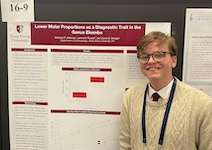 Stephen Attaway is a senior anthropology major with a specialization in field methods. For the past
two years he has worked in Stony Brook’s Human Paleontology Research Lab under Dr.
James Rossie quantifying intraspecific dental variation and generating taxonomic insights
from dental morphometrics. This year he presented his senior honors thesis research
on differentiating between species of the early Miocene ape Ekembo at the annual meetings of the American Association of Biological Anthropologists in Baltimore, Maryland, as
well as at the Northeast Vertebrate Evolution Symposium, and the URECA Student Symposium.
Stephen’s passion for paleoanthropology started his freshman year after enrolling
in an introductory course in biological anthropology. His passions have led him to
fieldwork in Wyoming and Kenya, as well as serving as Vice-President of Stony Brook’s
Undergraduate Anthropology Society. Stephen will continue his study of dental morphometrics
after graduation under the direction of Dr. Chris Gilbert of Hunter College.
Stephen Attaway is a senior anthropology major with a specialization in field methods. For the past
two years he has worked in Stony Brook’s Human Paleontology Research Lab under Dr.
James Rossie quantifying intraspecific dental variation and generating taxonomic insights
from dental morphometrics. This year he presented his senior honors thesis research
on differentiating between species of the early Miocene ape Ekembo at the annual meetings of the American Association of Biological Anthropologists in Baltimore, Maryland, as
well as at the Northeast Vertebrate Evolution Symposium, and the URECA Student Symposium.
Stephen’s passion for paleoanthropology started his freshman year after enrolling
in an introductory course in biological anthropology. His passions have led him to
fieldwork in Wyoming and Kenya, as well as serving as Vice-President of Stony Brook’s
Undergraduate Anthropology Society. Stephen will continue his study of dental morphometrics
after graduation under the direction of Dr. Chris Gilbert of Hunter College.
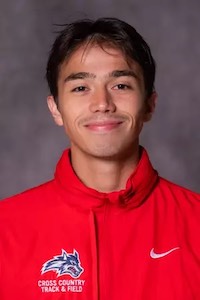 Thomas Burfeind is a Biomedical Engineering student in the Accelerated Master’s Program at Stony
Brook University. His research centers on the optimization of transcatheter aortic
valve replacement (TAVR) systems and intraocular surgical devices. Through the Biofluids
Research Group led by Dr. Danny Bluestein and PhD student mentor Kyle Baylous, Thomas
developed computational pipelines using Abaqus and MATLAB to iteratively optimize
polymer TAVR leaflet thickness and refine stent strut geometry for improved mechanical
durability. As design lead of the GorganEye project under Dr. Farzan Gorgani, he has prototyped an artificial intraocular lens
capsule and custom injector to enhance outcomes in cataract surgeries involving posterior
capsule rupture. Thomas also contributes to surgical innovation through his work with Tools for Surgery, mentored by colorectal surgeon Dr. Leiboff, the company’s CEO. There, he helped
redesign a bariatric tube for sleeve gastrectomies and gained hands-on experience
with 510(k) submission and medical device development. His interdisciplinary work
spans computational modeling, precision manufacturing, and translational design for
surgical care.
Thomas Burfeind is a Biomedical Engineering student in the Accelerated Master’s Program at Stony
Brook University. His research centers on the optimization of transcatheter aortic
valve replacement (TAVR) systems and intraocular surgical devices. Through the Biofluids
Research Group led by Dr. Danny Bluestein and PhD student mentor Kyle Baylous, Thomas
developed computational pipelines using Abaqus and MATLAB to iteratively optimize
polymer TAVR leaflet thickness and refine stent strut geometry for improved mechanical
durability. As design lead of the GorganEye project under Dr. Farzan Gorgani, he has prototyped an artificial intraocular lens
capsule and custom injector to enhance outcomes in cataract surgeries involving posterior
capsule rupture. Thomas also contributes to surgical innovation through his work with Tools for Surgery, mentored by colorectal surgeon Dr. Leiboff, the company’s CEO. There, he helped
redesign a bariatric tube for sleeve gastrectomies and gained hands-on experience
with 510(k) submission and medical device development. His interdisciplinary work
spans computational modeling, precision manufacturing, and translational design for
surgical care.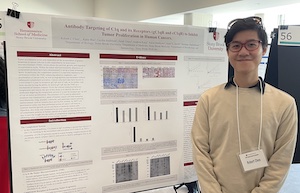 Robert Chen is a biology major with a specialization in Interdisciplinary Biology, and a chemistry
and rhetorical writing double minor. His interest in research was initially sparked
in high school during the summer of 2021 after joining the Marc Ladanyi lab at Memorial
Sloan Kettering. Under the mentorship of Dr. Pang-Dian Pan, he studied a novel strategy
of using transposon mutagenesis to identify genes related to treatment resistance
in cancer. Carrying his passion to study oncology, Robert now analyzes the dichotomous
role of the complement protein C1q and its receptors as a pro and anti-tumorigenic
agent in the Ghebrehiwet Laboratory. During the summer of 2023 and 2024, he has also
served as a research mentor training high school student researchers accepted under
the Simons research program in wet-bench laboratory techniques. During the 2024 URECA
symposium, Robert presented his research titled “Antibody Targeting of C1q and its
Receptors (gC1qR and cC1qR) to Inhibit Tumor Proliferation in Human Cancers,” which
explored using antibodies against complement proteins as a potential therapy against
a broad range of cancers. An abstract for this project was recently accepted to the
2025 American Association of Immunologists conference where he will be giving a poster
presentation on his research. Beyond research, Robert was also a volunteer EMT for
Port Jefferson EMS, as well as an English teacher both locally and abroad in Taiwan.
After graduation, he plans to pursue a career in medicine.
Robert Chen is a biology major with a specialization in Interdisciplinary Biology, and a chemistry
and rhetorical writing double minor. His interest in research was initially sparked
in high school during the summer of 2021 after joining the Marc Ladanyi lab at Memorial
Sloan Kettering. Under the mentorship of Dr. Pang-Dian Pan, he studied a novel strategy
of using transposon mutagenesis to identify genes related to treatment resistance
in cancer. Carrying his passion to study oncology, Robert now analyzes the dichotomous
role of the complement protein C1q and its receptors as a pro and anti-tumorigenic
agent in the Ghebrehiwet Laboratory. During the summer of 2023 and 2024, he has also
served as a research mentor training high school student researchers accepted under
the Simons research program in wet-bench laboratory techniques. During the 2024 URECA
symposium, Robert presented his research titled “Antibody Targeting of C1q and its
Receptors (gC1qR and cC1qR) to Inhibit Tumor Proliferation in Human Cancers,” which
explored using antibodies against complement proteins as a potential therapy against
a broad range of cancers. An abstract for this project was recently accepted to the
2025 American Association of Immunologists conference where he will be giving a poster
presentation on his research. Beyond research, Robert was also a volunteer EMT for
Port Jefferson EMS, as well as an English teacher both locally and abroad in Taiwan.
After graduation, he plans to pursue a career in medicine.
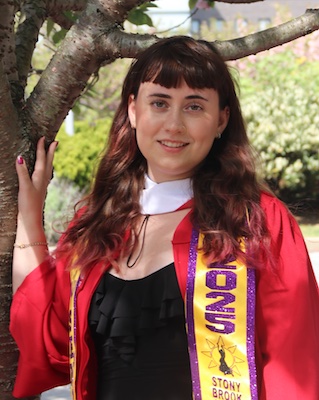 Emily Fredericks is a Sustainability Studies major, concentrating in Societies, Economics, and Governance.
Over the course of the past year, she conducted research under the direction of Dr.
Tara Rider, focused on the Lithium Triangle in South America, and the relationship
between a country's economic structure and its efficacy in environmental preservation,
especially in relation to the country's local Indigenous population for her Women
in Science and Engineering (WISE) honors thesis: for this project, she completed an
analysis of Bolivia, Argentina, and Chile's economic policy development over the past
5 decades and synthesized a policy recommendation for the United States if it were
to continue domestic lithium mining investment. Emily has also enjoyed working on
"A History of the Ashley Schiff Preserve", a project under the mentorship of Dr. Adam
Charboneau in collaboration with fellow senior Antonio Mochmann. In this project,
she conducted research through interviews of key players in the transformation of
the Ashley Schiff Preserve from a wild area to a memorial and vital green space on
Stony Brook's campus. Other work she has completed involves the Natural Shorelines
Project, in collaboration with her SUS 401 class in spring 2024. On campus, Emily
has worked in Student Engagement as a Student Support Specialist, as well as the Undergraduate
Student Government as Chief of Staff. She has founded and been a part of E-Board for
multiple clubs, including the Stony Brook Belly Dancers, for which she assists in
teaching and holds the role of treasurer. Emily enjoys growing orchid varieties in
her free time and loves the outdoors, especially the Adirondacks upstate. Emily plans
to pursue a Master's of Science in Earth and Environmental Sciences at Brooklyn College
in the fall.
Emily Fredericks is a Sustainability Studies major, concentrating in Societies, Economics, and Governance.
Over the course of the past year, she conducted research under the direction of Dr.
Tara Rider, focused on the Lithium Triangle in South America, and the relationship
between a country's economic structure and its efficacy in environmental preservation,
especially in relation to the country's local Indigenous population for her Women
in Science and Engineering (WISE) honors thesis: for this project, she completed an
analysis of Bolivia, Argentina, and Chile's economic policy development over the past
5 decades and synthesized a policy recommendation for the United States if it were
to continue domestic lithium mining investment. Emily has also enjoyed working on
"A History of the Ashley Schiff Preserve", a project under the mentorship of Dr. Adam
Charboneau in collaboration with fellow senior Antonio Mochmann. In this project,
she conducted research through interviews of key players in the transformation of
the Ashley Schiff Preserve from a wild area to a memorial and vital green space on
Stony Brook's campus. Other work she has completed involves the Natural Shorelines
Project, in collaboration with her SUS 401 class in spring 2024. On campus, Emily
has worked in Student Engagement as a Student Support Specialist, as well as the Undergraduate
Student Government as Chief of Staff. She has founded and been a part of E-Board for
multiple clubs, including the Stony Brook Belly Dancers, for which she assists in
teaching and holds the role of treasurer. Emily enjoys growing orchid varieties in
her free time and loves the outdoors, especially the Adirondacks upstate. Emily plans
to pursue a Master's of Science in Earth and Environmental Sciences at Brooklyn College
in the fall. 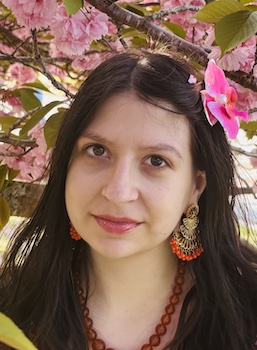 Eva Genovese is an aspiring publishing editor with a passion for storytelling. For over a year,
Eva has conducted research under the guidance of Dr. Margaret Echelbarger to answer
the question: How do authors of children’s books about money see their books as tools
to promote financial literacy? With support from the Jane & Armando Janelli-URECA
award and a URECA mini grant, she has been able to expand her project by designing
and conducting a second survey focusing on parental motivations for purchasing financial
literacy books for children. She recently presented her poster on her insights gathered
from the results of her author's survey at the URECA Celebration event, and plans
to work on it post-graduation. As double major in Creative Writing and Business Management
with a specialization in Marketing, Eva has also completed a second thesis project
she has finished through the mentorship and advice of Genevieve Sly Crane and Marissa
Levien of the Creative Writing Department. She wrote her first full length novella
titled When Sisters Align-- a blend between horror, fantasy, and historical fiction
that explores the strength of sisterhood strained by premature adult responsibilities,
with a dash of magical elements. On campus, Eva was editor in chief for the Sandpiper
Review August 2024 to May 2025, her department’s literary magazine. The 4th Issue
of the Sandpiper Review is available on the club’s website for any interested in the
club’s mission of promoting and supporting young aspiring artists.
Eva Genovese is an aspiring publishing editor with a passion for storytelling. For over a year,
Eva has conducted research under the guidance of Dr. Margaret Echelbarger to answer
the question: How do authors of children’s books about money see their books as tools
to promote financial literacy? With support from the Jane & Armando Janelli-URECA
award and a URECA mini grant, she has been able to expand her project by designing
and conducting a second survey focusing on parental motivations for purchasing financial
literacy books for children. She recently presented her poster on her insights gathered
from the results of her author's survey at the URECA Celebration event, and plans
to work on it post-graduation. As double major in Creative Writing and Business Management
with a specialization in Marketing, Eva has also completed a second thesis project
she has finished through the mentorship and advice of Genevieve Sly Crane and Marissa
Levien of the Creative Writing Department. She wrote her first full length novella
titled When Sisters Align-- a blend between horror, fantasy, and historical fiction
that explores the strength of sisterhood strained by premature adult responsibilities,
with a dash of magical elements. On campus, Eva was editor in chief for the Sandpiper
Review August 2024 to May 2025, her department’s literary magazine. The 4th Issue
of the Sandpiper Review is available on the club’s website for any interested in the
club’s mission of promoting and supporting young aspiring artists.
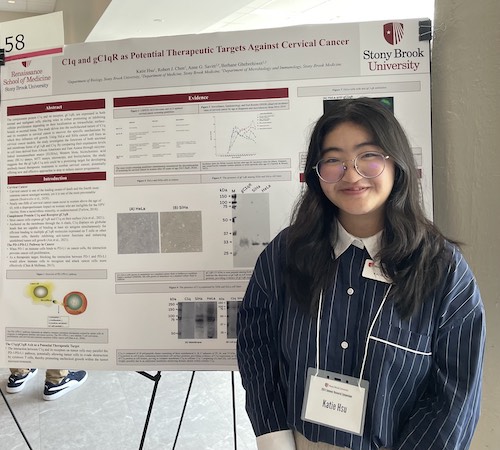 Katie Hsu is a Psychology major with a double minor in Writing & Rhetoric and Biology in the
Honors College. She began her research journey in her freshman year, conducting cervical
cancer research at Weill Cornell Medicine's Department of Population Health Sciences.
Afterwards, she began working in both the Moyer Psychology Lab and the Ghebrehiwet
Immunology Lab. She was awarded the Frances Velay Women and Science Research Fellowship
to support her immunology research on the role of C1q and its receptors in cervical
cancer. She also served as a mentor to four Simons Summer Research Program students,
teaching laboratory techniques and guiding their independent projects. Katie completed
her Psychology Honors Project and Honors College Senior Thesis under the direction
of Dr. Anne Moyer (Dept. of Psychology) examining the impact of COVID-19 on college
students’ friendships, sense of belonging, optimism, and stress. She presented her
immunology research at the American Association of Immunologists' IMMUNOLOGY2025 research
conference. After graduation, Katie plans to apply to medical school.
Katie Hsu is a Psychology major with a double minor in Writing & Rhetoric and Biology in the
Honors College. She began her research journey in her freshman year, conducting cervical
cancer research at Weill Cornell Medicine's Department of Population Health Sciences.
Afterwards, she began working in both the Moyer Psychology Lab and the Ghebrehiwet
Immunology Lab. She was awarded the Frances Velay Women and Science Research Fellowship
to support her immunology research on the role of C1q and its receptors in cervical
cancer. She also served as a mentor to four Simons Summer Research Program students,
teaching laboratory techniques and guiding their independent projects. Katie completed
her Psychology Honors Project and Honors College Senior Thesis under the direction
of Dr. Anne Moyer (Dept. of Psychology) examining the impact of COVID-19 on college
students’ friendships, sense of belonging, optimism, and stress. She presented her
immunology research at the American Association of Immunologists' IMMUNOLOGY2025 research
conference. After graduation, Katie plans to apply to medical school.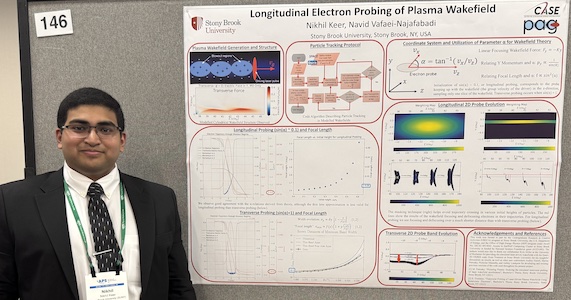 Nikhil Keer is a physics (optics specialization) and mathematics major in the Honors College.
He started research with his advisor Prof. Navid Vafaei-Najafabadi in the Summer 2024
URECA program, continuing into his senior year, after taking Prof. Vafaei-Najafabadi’s
graduate course on plasma physics and wakefield acceleration. Nikhil’s project is
simulating electron probing of the CO2 laser-driven plasma wakefield to better understand its unique electromagnetic field
structure. This provides experimental diagnostics for experiments performed at Brookhaven
National Laboratory’s Accelerator Test Facility (BNL’s ATF), contributing to research
towards plasma wakefields for particle acceleration and focusing, needed for more
compact particle accelerators and colliders for high-energy physics. Nikhil presented
this work at the 2024 APS Division of Plasma Physics (DPP) annual conference, BNL
ATF Tours for the DOE high energy physics directors, Physics Department 3rd Undergraduate
Colloquium, 3rd Physics Undergraduate Research Day, and URECA and Honors College Symposia. He has
served as a peer mentor for physics underclassmen and an undergraduate TA for introductory
physics labs. Nikhil is a recipient of the Provost’s Award for Academic Excellence
and the Barry Barish Undergraduate Research Travel Award, and a member of the Sigma
Pi Sigma (physics) and Phi Beta Kappa (national) honor societies. After graduating
summa cum laude, he will pursue a PhD in nuclear science and engineering at MIT for
plasma physics starting Fall 2025.
Nikhil Keer is a physics (optics specialization) and mathematics major in the Honors College.
He started research with his advisor Prof. Navid Vafaei-Najafabadi in the Summer 2024
URECA program, continuing into his senior year, after taking Prof. Vafaei-Najafabadi’s
graduate course on plasma physics and wakefield acceleration. Nikhil’s project is
simulating electron probing of the CO2 laser-driven plasma wakefield to better understand its unique electromagnetic field
structure. This provides experimental diagnostics for experiments performed at Brookhaven
National Laboratory’s Accelerator Test Facility (BNL’s ATF), contributing to research
towards plasma wakefields for particle acceleration and focusing, needed for more
compact particle accelerators and colliders for high-energy physics. Nikhil presented
this work at the 2024 APS Division of Plasma Physics (DPP) annual conference, BNL
ATF Tours for the DOE high energy physics directors, Physics Department 3rd Undergraduate
Colloquium, 3rd Physics Undergraduate Research Day, and URECA and Honors College Symposia. He has
served as a peer mentor for physics underclassmen and an undergraduate TA for introductory
physics labs. Nikhil is a recipient of the Provost’s Award for Academic Excellence
and the Barry Barish Undergraduate Research Travel Award, and a member of the Sigma
Pi Sigma (physics) and Phi Beta Kappa (national) honor societies. After graduating
summa cum laude, he will pursue a PhD in nuclear science and engineering at MIT for
plasma physics starting Fall 2025. 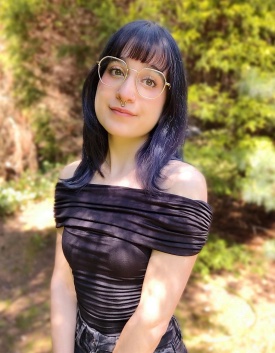 Alexandria Locke is an Interdisciplinary Biology major and Japanese Studies minor, and has been involved
in research projects concerning both her major and minor. She was first involved in
research when still in Suffolk County Community College, when she was accepted into
SBU’s BioPREP program under Dr. Daniel Moloney, and worked with the program during
the summers of 2021-2022, researching Cancer biology. Her research project, Analysis
of Yerba Mate Aqueous Extract on H460 Lung Cancer Cells, was presented not only in
the 2021 URECA symposium but also, at the 2021 ABRCMS national convention and won
an award in Cancer biology. This year, under the guidance of Professor Eva Nagase,
Alexandria and her research partner Meghan Mallia, were able to examine Japanese culture
and folklore and present "Capturing the Spirits of Japan: Life and Impact of Lafcadio Hearn's Kwaidan" at this year’s URECA poster symposium, as well as at the Asian and Asian American
Studies Symposium. To complete her minor, Alexandria will be traveling with Stony
Brook University’s study abroad program to Mishima, Japan under her mentor, Professor
Eva Nagase. After graduating, she hopes to attend graduate school to get her Ph.D.
in Biology.
Alexandria Locke is an Interdisciplinary Biology major and Japanese Studies minor, and has been involved
in research projects concerning both her major and minor. She was first involved in
research when still in Suffolk County Community College, when she was accepted into
SBU’s BioPREP program under Dr. Daniel Moloney, and worked with the program during
the summers of 2021-2022, researching Cancer biology. Her research project, Analysis
of Yerba Mate Aqueous Extract on H460 Lung Cancer Cells, was presented not only in
the 2021 URECA symposium but also, at the 2021 ABRCMS national convention and won
an award in Cancer biology. This year, under the guidance of Professor Eva Nagase,
Alexandria and her research partner Meghan Mallia, were able to examine Japanese culture
and folklore and present "Capturing the Spirits of Japan: Life and Impact of Lafcadio Hearn's Kwaidan" at this year’s URECA poster symposium, as well as at the Asian and Asian American
Studies Symposium. To complete her minor, Alexandria will be traveling with Stony
Brook University’s study abroad program to Mishima, Japan under her mentor, Professor
Eva Nagase. After graduating, she hopes to attend graduate school to get her Ph.D.
in Biology.
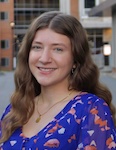 Reese McQueen is a biology major and a women’s, gender, and sexuality studies minor in the Honors
College. For the past two years, she has conducted cytogenetics research through the
International Circle of Genetic Studies Project under the mentorship of Dr. Carlos
A. Tirado. Her primary research focuses on hyperdiploidy in acute myeloid leukemia
and the epigenetics of myelodysplastic syndromes. In addition, Reese collaborated
with Dr. Catherine Marrone on her Honors College senior thesis, “Examining the Gap
between the Application and Practice of Disability Education in Prenatal Genetic Counseling.”
After graduation, Reese will attend the University of Connecticut’s genetic counseling
master’s program, where she plans to pursue her passion for genetics and work toward
becoming a prenatal genetic counselor. Reese is a recipient of the Provost's Award
for Academic Excellence.
Reese McQueen is a biology major and a women’s, gender, and sexuality studies minor in the Honors
College. For the past two years, she has conducted cytogenetics research through the
International Circle of Genetic Studies Project under the mentorship of Dr. Carlos
A. Tirado. Her primary research focuses on hyperdiploidy in acute myeloid leukemia
and the epigenetics of myelodysplastic syndromes. In addition, Reese collaborated
with Dr. Catherine Marrone on her Honors College senior thesis, “Examining the Gap
between the Application and Practice of Disability Education in Prenatal Genetic Counseling.”
After graduation, Reese will attend the University of Connecticut’s genetic counseling
master’s program, where she plans to pursue her passion for genetics and work toward
becoming a prenatal genetic counselor. Reese is a recipient of the Provost's Award
for Academic Excellence.
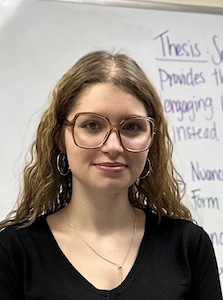 Anastasija Petrovska is a Philosophy and English major graduating with honors in both disciplines. Her
Philosophy honors research, funded by the 2024 URECA Summer Research Program and supervised
by Dr. Anne O'Byrne, examined the ethical and political implications of artificial
intelligence art through the frameworks of Hannah Arendt and Susan Sontag. Her project
focused on themes of inaction as expressed through form (online platforms), context
(language), and content (the degree and role of technology). She presented this work,
titled Political Inactivism, at the 2025 Puget Sound Conference and the Pacific Division Meeting of the American
Philosophical Association.Her English honors thesis, completed under the mentorship
of Dr. Celia Marshik, applied Julia Kristeva’s theory of abjection to the subject-object
dynamic in aesthetic performance. Drawing on archival materials related to Rhythm 0 and Cloud 9, the project explored how political art provokes ethical responses in its audience
and examined the role of language in mediating action on behalf of others. She presented
her findings at the 2025 Stony Brook URECA Symposium. Anastasija is the recipient
of the 2025 Provost Award and the 2023 Lilian DeWaal Memorial Scholarship for Outstanding
English Student. In addition to her research, she served as a teaching assistant for
Philosophy of Science under Dr. Lorenzo Simpson and completed internships with the
Stony Brook Center for Civic Justice and the Her Story Memoir Writing Program, where
she contributed to civic education and public-facing writing initiatives. After graduating,
she will continue her academic work in philosophy through graduate study, research,
and teaching.
Anastasija Petrovska is a Philosophy and English major graduating with honors in both disciplines. Her
Philosophy honors research, funded by the 2024 URECA Summer Research Program and supervised
by Dr. Anne O'Byrne, examined the ethical and political implications of artificial
intelligence art through the frameworks of Hannah Arendt and Susan Sontag. Her project
focused on themes of inaction as expressed through form (online platforms), context
(language), and content (the degree and role of technology). She presented this work,
titled Political Inactivism, at the 2025 Puget Sound Conference and the Pacific Division Meeting of the American
Philosophical Association.Her English honors thesis, completed under the mentorship
of Dr. Celia Marshik, applied Julia Kristeva’s theory of abjection to the subject-object
dynamic in aesthetic performance. Drawing on archival materials related to Rhythm 0 and Cloud 9, the project explored how political art provokes ethical responses in its audience
and examined the role of language in mediating action on behalf of others. She presented
her findings at the 2025 Stony Brook URECA Symposium. Anastasija is the recipient
of the 2025 Provost Award and the 2023 Lilian DeWaal Memorial Scholarship for Outstanding
English Student. In addition to her research, she served as a teaching assistant for
Philosophy of Science under Dr. Lorenzo Simpson and completed internships with the
Stony Brook Center for Civic Justice and the Her Story Memoir Writing Program, where
she contributed to civic education and public-facing writing initiatives. After graduating,
she will continue her academic work in philosophy through graduate study, research,
and teaching.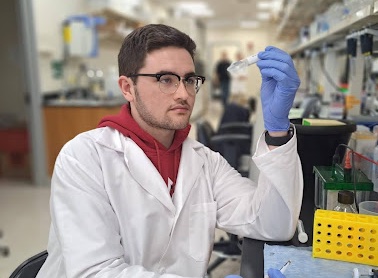 Christian Reilly is pursuing a double major in Biology and Psychology. He has been involved as an
undergraduate researcher in the laboratory of Dr. Shipra Agrawal in the Division of
Nephrology and Hypertension at Stony Brook Medicine and was funded in summer 2023
through the URECA-Chhabra fellowship; and in summer 2024 through the SUNY SOAR program.
He has also been active as a Resident Assistant, an Athletics Peer Tutor, an INSPIRE
Peer Mentor, a University Senator, and is a member of the Stony Brook Ultimate Frisbee
team. Christian has a passion for medicine, and a deep desire to expand access to
healthcare for underserved populations. This is why he spent part of last summer as
an intern with Volunteers Around the World (VAW), where he helped operate a medical
clinic in the Dominican Republic, providing care to communities in need. Following
graduation, Christian will continue this commitment to service as he begins his medical
education at the Renaissance School of Medicine at Stony Brook University, with the
goal of making a lasting impact in the lives of his future patients. Christian is
a recipient of the Provost Award for Academic Excellence.
Christian Reilly is pursuing a double major in Biology and Psychology. He has been involved as an
undergraduate researcher in the laboratory of Dr. Shipra Agrawal in the Division of
Nephrology and Hypertension at Stony Brook Medicine and was funded in summer 2023
through the URECA-Chhabra fellowship; and in summer 2024 through the SUNY SOAR program.
He has also been active as a Resident Assistant, an Athletics Peer Tutor, an INSPIRE
Peer Mentor, a University Senator, and is a member of the Stony Brook Ultimate Frisbee
team. Christian has a passion for medicine, and a deep desire to expand access to
healthcare for underserved populations. This is why he spent part of last summer as
an intern with Volunteers Around the World (VAW), where he helped operate a medical
clinic in the Dominican Republic, providing care to communities in need. Following
graduation, Christian will continue this commitment to service as he begins his medical
education at the Renaissance School of Medicine at Stony Brook University, with the
goal of making a lasting impact in the lives of his future patients. Christian is
a recipient of the Provost Award for Academic Excellence.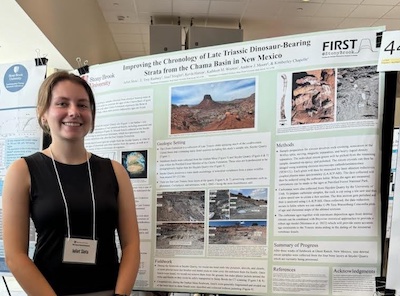 Juliet Slota is a geology major in the Women in Science and Engineering (WISE) Honors Program.
She has been working with Dr. Troy Rasbury and PhD student Kevin Hatton in the Department
of Geology's Facility for Isotope Research and Student Training (FIRST) lab since
2023. Her main project is a collaboration with the Department of Anatomical Sciences
through Dr. Josef Stiegler using U-Pb detrital zircon geochronology to constrain the
ages of Triassic dinosaurs. She has traveled to New Mexico to participate in fieldwork,
collecting rock samples and helping with fossil collection. In the summer of 2024,
she participated in research full-time as a Frances Velay Women and Science Research
Fellow. She presented this research at the URECA summer symposium and the Northeast
Regional Vertebrate Evolution Symposium (NERVES). Juliet will be pursuing a PhD at
the University of Kansas.
Juliet Slota is a geology major in the Women in Science and Engineering (WISE) Honors Program.
She has been working with Dr. Troy Rasbury and PhD student Kevin Hatton in the Department
of Geology's Facility for Isotope Research and Student Training (FIRST) lab since
2023. Her main project is a collaboration with the Department of Anatomical Sciences
through Dr. Josef Stiegler using U-Pb detrital zircon geochronology to constrain the
ages of Triassic dinosaurs. She has traveled to New Mexico to participate in fieldwork,
collecting rock samples and helping with fossil collection. In the summer of 2024,
she participated in research full-time as a Frances Velay Women and Science Research
Fellow. She presented this research at the URECA summer symposium and the Northeast
Regional Vertebrate Evolution Symposium (NERVES). Juliet will be pursuing a PhD at
the University of Kansas.
 Aman Rahman is a Muslim poet, educator, and public health worker living on Long Island, NY, double
majoring in Health Sciences and English. He currently is managing editor of the undergraduate
journal Sandpiper Review. His poetry has appeared in Narrative, Consequence, Ecotone, Mizna, and elsewhere, and his work has been recognized by the Islamic Scholarship Fund,
and the Porter House Review Editor's Prize. He is currently at work on a collection of poetry with support from
URECA and Dr. Christine Kitano in the Department of Creative Writing and Literature.
Aman has served as a TA for Dr. Andrew Flescher; English 204: Literary Analysis and
Argumentation; and taken graduate level coursework on Medical Humanities and Disability
Studies. Aman also conducted a survey of Muslim American students' substance use under the supervision
of Dr. Sharon Cuff in the School of Health Professions. He has also served as a Writing Center tutor from Fall 2023 to the present. He was
one of fourteen SBU students honored with the 2024 Chancellor's Award for Student
Excellence.
Aman Rahman is a Muslim poet, educator, and public health worker living on Long Island, NY, double
majoring in Health Sciences and English. He currently is managing editor of the undergraduate
journal Sandpiper Review. His poetry has appeared in Narrative, Consequence, Ecotone, Mizna, and elsewhere, and his work has been recognized by the Islamic Scholarship Fund,
and the Porter House Review Editor's Prize. He is currently at work on a collection of poetry with support from
URECA and Dr. Christine Kitano in the Department of Creative Writing and Literature.
Aman has served as a TA for Dr. Andrew Flescher; English 204: Literary Analysis and
Argumentation; and taken graduate level coursework on Medical Humanities and Disability
Studies. Aman also conducted a survey of Muslim American students' substance use under the supervision
of Dr. Sharon Cuff in the School of Health Professions. He has also served as a Writing Center tutor from Fall 2023 to the present. He was
one of fourteen SBU students honored with the 2024 Chancellor's Award for Student
Excellence.
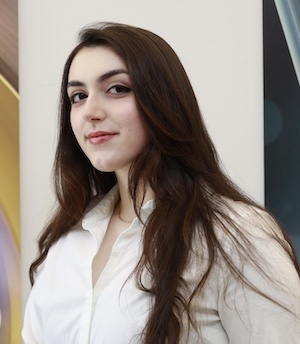 Ciara Woellhof is a Biomedical Engineering major with a double major in Applied Mathematics and Statistics
at Stony Brook University, specializing in Biomechanics and Biomaterials with a focus
on computational biomechanics. She currently works as a Biomechanical Analyst at IAMBIC,
where she contributes to the development of precision-fit footwear. Her research experience
includes work on Commotio Cordis in Dr. Qin’s lab, TAVR stent optimization for bicuspid
aortic valve disease in Dr. Bluestein’s lab—also the subject of her senior honors
thesis—and kidney engineering in Dr. Rubenstein’s VIP Team, where she served as a
team lead. Ciara also holds leadership roles as President of both Alpha Eta Mu Beta
(AEMB) and 3D PATH, and has presented her research at BMES, NEBEC, and URECA. She
will present her work at the SB3C Undergraduate Student Paper Competition in Summer
2025.
Ciara Woellhof is a Biomedical Engineering major with a double major in Applied Mathematics and Statistics
at Stony Brook University, specializing in Biomechanics and Biomaterials with a focus
on computational biomechanics. She currently works as a Biomechanical Analyst at IAMBIC,
where she contributes to the development of precision-fit footwear. Her research experience
includes work on Commotio Cordis in Dr. Qin’s lab, TAVR stent optimization for bicuspid
aortic valve disease in Dr. Bluestein’s lab—also the subject of her senior honors
thesis—and kidney engineering in Dr. Rubenstein’s VIP Team, where she served as a
team lead. Ciara also holds leadership roles as President of both Alpha Eta Mu Beta
(AEMB) and 3D PATH, and has presented her research at BMES, NEBEC, and URECA. She
will present her work at the SB3C Undergraduate Student Paper Competition in Summer
2025.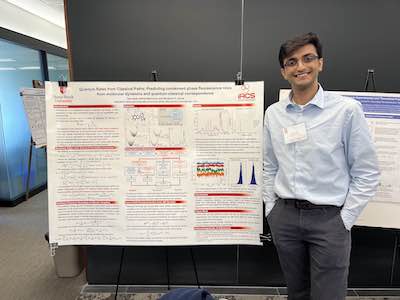 Zain Zaidi is a Chemistry Major specializing in Chemical Physics. He first got involved in research
at the start of his freshman year, studying the photophysics of hydroxyphenyl oxazoles
under the supervision of Dr. Arshad Mehmood and Dr. Benjamin Levine. The following
summer, he was awarded the ACS COMP Undergraduate Poster Award for this work. As a
sophomore, Zain joined the NSF Center for Adapting Flaws into Features, where he investigated
the photoluminescent properties of nitrogen-doped quantum dots. That same year, he
was named a Barry Goldwater Scholar in recognition of his research excellence and
presented his work at the 2024 URECA Symposium. During his third year, Zain completed
his senior thesis titled “Toward High-Throughput First-Principles Prediction of Fluorescence
Quantum Yields for Organic Dyes in Complex Environments.” In this project, he developed
novel, efficient methods for predicting the fluorescence efficiency of dyes in solution,
advancing a problem previously considered computationally intractable. Beyond research,
Zain serves as a tutor and executive board member of the Society of Physics Students,
where he led the development of a cost-efficient Mach-Zehnder interferometer and taught
quantum mechanics fundamentals to high school students. After graduation, he will
be attending Princeton University to pursue a Ph.D. in Theoretical Chemistry. Zain
was inducted into Phi Beta Kappa and is a recipient of the Chancellor’s Award for
Student Excellence.
Zain Zaidi is a Chemistry Major specializing in Chemical Physics. He first got involved in research
at the start of his freshman year, studying the photophysics of hydroxyphenyl oxazoles
under the supervision of Dr. Arshad Mehmood and Dr. Benjamin Levine. The following
summer, he was awarded the ACS COMP Undergraduate Poster Award for this work. As a
sophomore, Zain joined the NSF Center for Adapting Flaws into Features, where he investigated
the photoluminescent properties of nitrogen-doped quantum dots. That same year, he
was named a Barry Goldwater Scholar in recognition of his research excellence and
presented his work at the 2024 URECA Symposium. During his third year, Zain completed
his senior thesis titled “Toward High-Throughput First-Principles Prediction of Fluorescence
Quantum Yields for Organic Dyes in Complex Environments.” In this project, he developed
novel, efficient methods for predicting the fluorescence efficiency of dyes in solution,
advancing a problem previously considered computationally intractable. Beyond research,
Zain serves as a tutor and executive board member of the Society of Physics Students,
where he led the development of a cost-efficient Mach-Zehnder interferometer and taught
quantum mechanics fundamentals to high school students. After graduation, he will
be attending Princeton University to pursue a Ph.D. in Theoretical Chemistry. Zain
was inducted into Phi Beta Kappa and is a recipient of the Chancellor’s Award for
Student Excellence.
Karen. How did being involved in research enhance your education?
Stephen. Research provided me the opportunity to explore my curiosities fully, with the support
and advice of world leading researchers. Research not only allowed me to learn new
things, but also provided me with motivation to dive deeper into my passions and become
the best student and scientist that I can be.
Juliet. My research in geochronology has deepened my understanding of geology as a whole
by helping me connect classroom learning with hands-on lab experience. It has also
given me the opportunity to travel to New Mexico and Arizona, where I’ve been able
to apply that knowledge directly in the field.
Christian.Being a student researcher has been one of the most rewarding yet challenging things
that I’ve done; however, I’m incredibly grateful for the opportunity that I’ve had.
Being involved in research has truly enhanced my education by bridging the gap between
textbook knowledge and its real-world application. It’s one thing to learn about experimentation
and molecular pathwaysin one of your classes, but it’s a whole new experience to design
your own experiments and apply them to real biological questions.
Alexandria. Research is an amazing opportunity that everyone should be encouraged to try. The experience of doing research not only allows you to get close to your advisors and faculty members, but it allows you to take a deeper look into if this area of study is right for you. I found that the research that I have been grateful to be a part of, has motivated me to work harder to reach my career goals and gives me the experience I need to be confident in my abilities to perform and actually do research. To be working in the lab, or one on one with a mentor, allows you to apply techniques you’ve been learning about your entire college career, and receive actual feedback and results that would be impossible to get from a textbook or class.
Zain. Being involved in research pushed me to extend my knowledge far beyond what is required
in class. It made me understand what gaps I had in my thinking and taught me ways
to properly approach tackling and organizing long term problems and projects.
Karen. What's your favorite aspect of doing research?
Ana. My favorite aspect of doing research is its communal nature. First, there’s the experience
of entering a conversation you’re drawn to—conducting a literature review, encountering
perspectives and voices you hadn’t previously considered, and allowing those insights
to shape your thinking in a generative, reciprocal way. Second, there’s the collaborative
process of working with a faculty member who guides you through the gestures and refinements
of an idea, helping you shape it into something uniquely your own. Finally, there’s
the stage of sharing (whether through conferences, the URECA symposium, or other forums)
where you come to understand your own ideas more deeply by presenting them and engaging
with others. At every stage, research creates a kind of built-in community, offering
continuous opportunities to engage with creative people and diverse perspectives.
Robert. My favorite aspect of doing research is the opportunity one might get to guide and
support newer researchers. I feel that once you familiarize yourself not only with
the wet-bench techniques but also what topic you are interested in, you are better
able to not only help lay people understand your research but also other students
understand how to do research.
Eva. My favorite part of research is exploring the current academic landscape on a specific
topic and using that knowledge to piece together a broader understanding of how my
niche of interest relates to the world at large. For my business honors project, I
conducted an extensive literature review on financial literacy, which revealed a compelling
contradiction: while financial education is widely recognized as essential by lawmakers
and the general public alike, it remains largely excluded from standard school curricula.
This leaves children and teens left to seek out this critical knowledge on their own,
often without success unless they have already been pre-exposed to the concept. This
insight has deepened my understanding of the systemic challenges faced in promoting
financial literacy and helped highlight the impact my research could make.
Aman. I had the opportunity to dive deeply into a topic I was passionate about. Because
I was writing poetry, I read extensively from American poets—most influentially, Louise
Glück, Mary Oliver, and Kaveh Akbar—though I also read in some other traditions—from
the pre-Islamic elegies of Al-Khansa to the 14th century Sufi poet Hafez and the contemporary
writer Iman Mersal. And now I get to share what I've learned about the ghazal and
elegiac forms with anyone who cares to listen!
Karen. How has doing research prepared you for your future career?
Reese. As an aspiring prenatal genetic counselor, I have developed the ability to convey
and interpret complex genetic information succinctly through my experiences presenting
at conferences and writing manuscripts. The analytical, comprehension, and communication
skills I have gained from my research experience will enable me to practice at the
forefront of the genetics field and effectively relay critical information to my patients.
Nikhil. Success in my research has led to multiple presentations where I have been able to engage in professional communication of research and networking with people in my field. Through research, I have become more patient, persistent, and resourceful. Ultimately, research showcased my potential to do meaningful work.
Karen. What have you learned from your interactions with your mentor and colleagues in your lab?
Katie. From the very beginning, Dr. Ghebrehiwet's lab and Dr. Moyer's labs both showed me the beauty of curiosity, the strength in resilience, and the power of working together with kindness. Dr. Ghebrehiwet taught me that true leadership grows from patience, and true mentorship means believing in someone’s potential even before they do. Dr. Moyer, with her radiant dedication to her students, made rigor feel like wonder, and challenges feel like possibilities waiting to be unlocked.
Ciara. I've learned the importance of always asking questions. Targeted curiosity directed towards friends, professors, or peers often leads to valuable insights, new skills, or unexpected research interests. No matter someone’s role or experience, there's always something to learn from those around you. Above all else, never stop learning.
Karen. What advice about research do you have for other undergrads?
Emily. While brainstorming topics, write every idea down- even the ones that aren't your
favorite at first. Looking back on my experience, I would advise that you let your
initial topic selection process stay very open and flexible. I didn't even know what
I didn't know until I allowed my curiosity to take me to topics I would've never thought
of at first. I really enjoy the topic I picked, but I only found it because I kept
very detailed notes of my preliminary literature review and could reference them later.
Thomas. Don’t wait until you feel ready — dive in early. I’ve learned that you grow into
research; no one starts off knowing it all. Ask questions, take initiative, and treat
setbacks as part of the process. The best projects come from a willingness to take
risks on unfamiliar, challenging problems — that’s where real skill development happens.
